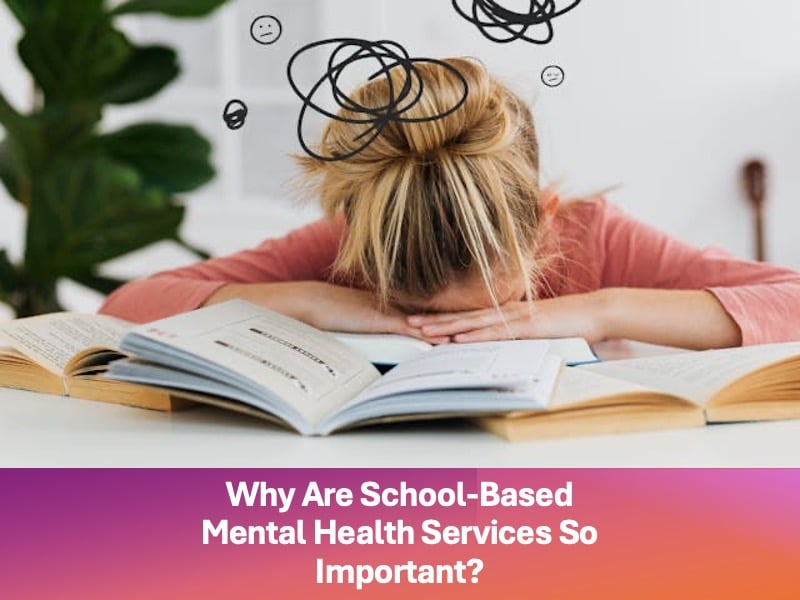Why Are School-Based Mental Health Services So Important?
School-based mental health services are essential for addressing the growing emotional and psychological needs of students in today’s complex educational landscape.
With increased rates of anxiety, depression, trauma, and behavioral challenges among children and adolescents, schools are uniquely positioned to provide consistent support due to their daily access to students and central role in children’s lives.
This proximity allows for early identification, timely intervention, and the normalization of mental health care.
Yet effective implementation goes beyond simple awareness.
It requires trained professionals who understand both clinical best practices and the inner workings of the school environment.
The need is urgent: many educational institutions lack the personnel or frameworks to fully support student well-being.
Developing a robust system of school-based mental health services ensures that students receive the care they need within the familiar and accessible setting of their school, thereby improving their emotional health, academic performance, and long-term life outcomes.
What Are School-Based Mental Health Services?

School-based mental health services are psychological, emotional, and behavioral health supports provided directly within school settings to help students thrive both academically and personally.
These services are designed to identify, prevent, and address mental health issues early by integrating care into the daily lives of students.
They can include individual and group counseling, crisis intervention, mental health screenings, referrals to outside providers, social-emotional learning (SEL) programs, and staff training in trauma-informed practices.
Services are typically delivered by school psychologists, counselors, social workers, and sometimes licensed therapists who work on campus or in partnership with schools.
By meeting students where they are, physically and developmentally, school-based mental health services remove common barriers like transportation, cost, and stigma.
This makes them a critical component of comprehensive student support systems that promote resilience, emotional regulation, and overall well-being.
How to Build Expertise to Deliver Effective School-Based Mental Health Services
A strong foundation in both clinical knowledge and educational dynamics is essential for professionals delivering school-based mental health services.
The path begins with comprehensive training programs that emphasize psychological theory, child development, behavioral assessment, and school-wide intervention strategies.
Accredited school psychology programs serve as a cornerstone, offering the academic rigor and hands-on experience needed to prepare future practitioners for the realities of school environments.
What distinguishes these programs is their integration of mental health expertise with the unique challenges and workflows of educational systems.
This dual focus produces professionals who can meet clinical standards while navigating the practical constraints of school operations.
By including coursework on ethics, crisis response, and interdisciplinary collaboration, these programs ensure that graduates are well-equipped to lead, adapt, and innovate within school-based mental health services.
How to Adapt School-Based Mental Health Services to Meet Changing Needs of Students
School-based mental health services must evolve to address the growing pressures students face today, from digital overload and academic stress to social media and family instability.
The modern role of school-based mental health professionals extends beyond crisis response; they are now essential in shaping inclusive, psychologically safe school cultures.
Training programs emphasize trauma-informed care, cultural competence, and the ability to recognize subtle signs of distress, even in high-achieving or outwardly social students.
Advocates are also taught to manage complex communication among educators, families, and health agencies, ensuring trust and confidentiality.
Through internships, simulations, and real-world exercises, future professionals build the adaptive skills and clinical judgment needed to respond effectively in school environments.
As social-emotional learning (SEL) becomes integrated into education, these professionals collaborate with teachers to design strategies that promote both academic success and emotional well-being, ensuring that school-based mental health services are woven into the fabric of student life.
Collaborative Skills: The Foundation of School-Based Mental Health Services
Effective school-based mental health services depend on seamless collaboration across educational teams.
Mental health advocates collaborate with counselors, teachers, administrators, nurses, and families to provide comprehensive support.
Training programs reflect this interdisciplinary need by embedding collaboration into the learning process through group projects, case simulations, and role-play scenarios.
Future advocates are taught to lead initiatives such as school-wide awareness campaigns, peer support programs, and mental health components of Individualized Education Plans (IEPs).
For example, research increasingly supports the connection between sports and academic performance, suggesting that physical activity can improve cognitive function, focus, and classroom behavior.
These are key areas where school-based mental health advocates can collaborate with other staff to develop better mental health for students.
Strong communication skills are emphasized so that professionals can explain psychological concepts in language accessible to students, parents, and staff alike, making mental health more approachable and actionable.
Promoting Preventative Mental Health Strategies

While crisis response is still essential, the future of school-based mental health services is rooted in prevention.
Preventative strategies, such as universal mental health screenings, wellness check-ins, and integrated social-emotional learning (SEL) lessons, help identify and mitigate issues before they escalate.
Advocates are trained to interpret school climate data, behavioral trends, and attendance patterns to guide early intervention strategies.
This proactive approach empowers schools to promote emotional well-being across all grade levels, rather than reacting only when problems arise.
Incorporating school-based mental health services alongside other basic health and fitness tips for children creates a more comprehensive approach to student well-being, supporting both emotional resilience and physical development.
For example, programs that promote team-based fitness for kids not only improve physical health but also develop social-emotional skills such as cooperation, empathy, and self-confidence, which are key elements of preventive school-based mental health services.
Lifelong Learning for Mental Health Professionals
To remain effective, school-based mental health advocates must engage in ongoing professional development.
The mental health landscape evolves rapidly with the rise of digital stressors, new therapeutic modalities, and changing student needs.
Continuing education, including workshops, certifications, and training in areas such as cyberbullying response, virtual counseling, and digital wellness, ensures that advocates stay current and capable of addressing modern challenges.
Without consistent updates, even well-trained professionals may fall behind in best practices.
Addressing the Shortage of School-Based Mental Health Professionals
Despite growing demand, many schools, especially in underserved areas, lack dedicated mental health professionals.
Strengthening the pipeline requires targeted outreach, financial incentives, and early exposure to this career path.
Training institutions can help by offering scholarships, mentorship, and awareness campaigns that position school-based mental health services as a vital and fulfilling profession.
Encouraging high school and college students to explore this field ensures the next generation is ready to meet the needs of diverse school communities.
Final Thoughts: The Lasting Impact of School-Based Mental Health Services
School-based mental health services are more than a reactive solution; they are a proactive investment in the lifelong health, academic achievement, and personal development of students.
For example, a longitudinal study of over 37,000 Chilean elementary students revealed that improvements in mental health between first and third grade were associated with significant gains in academic performance.
This highlights the crucial role that school-based mental health services play in promoting both emotional well-being and academic achievement.
As student needs evolve, schools must continue to adapt by training compassionate, skilled professionals who can deliver support where it’s needed most.
By embedding mental health services into the daily fabric of education, we create safer, more inclusive learning environments that empower every student to thrive.
A residential treatment program for teens may also become necessary when school-based mental health services are no longer enough to keep a student safe or stable, ensuring families understand that higher levels of care exist when a child needs support beyond what the school can provide.
The future of education depends on recognizing that mental wellness is not separate from learning, it is the foundation of it.
This website does not provide medical advice. This website site does contain affiliate links, and purchases may earn a commission.
Read my Medical Disclaimer, Review Disclaimer, and Publishing Policies for more details. Use of this site indicates acceptance of these terms.



